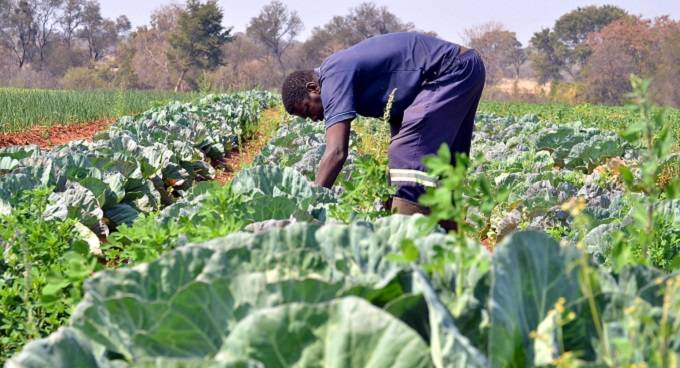Smallholder farmers as engines of economic growth

Mr Douglas Siziba of Enaleni Farm in Umguza inspects his crop which is ripe and ready for the market in this file picture
The Chronicle 30/10/2018
Liam Condon
GIVEN that there are over 5 000 languages worldwide, communication can sometimes still be very difficult. However, there is one common language that always brings people together and that is the language of food.
Food is not just a necessity, it’s an integral part of our culture. Food is at the centre of our gatherings, both in good times and in bad. And when food is lacking, it can cause misery, or even social unrest.
Despite agriculture’s progress in feeding more people on less land than at any time in history, there are still more than 800 million people who experience chronic hunger.
As the world population grows, so too does the trend toward increased urbanisation, which means that competition for limited natural resources between cities and rural communities will only intensify.
To minimise this, we need to strike the right balance between meeting our nutritional needs and preserving our environment.
While this challenge exists everywhere, it is particularly evident in Africa. Over the past 50 years, agricultural production in Africa has increased about four-fold, a feat which rivals that of India’s well-publicised Green Revolution. However, Africa’s population has grown more rapidly than that of India and as a result, food production per person fell during the latter half of the 20th century.
Africa has a full range of growing conditions, from areas of intense rainfall to regions with sporadic, seasonal rains. This diversity creates both challenges and opportunities for agricultural development.
Unlike most regions, which are represented by few large commodities, African agriculture is highly diversified that attention cannot be focused on any single crop. To achieve transformative change, green revolutions may be required. This presents an opportunity for African farmers.
Like many areas of the world, African agriculture is dominated by family farms of less than two hectares. These small farms are powerful drivers of local economies. In fact, 80 percent of the food consumed in developing countries is produced by more than 475 million smallholder farms.
When talking about agricultural innovation, no discussion is complete without the inclusion of smallholders as crucial engines of economic growth.
Smallholder farms are a primary source of food and income, providing up to 60 percent of African jobs.
These diversified smallholder farms can play a vital part of Africa’s future and will benefit from the region’s vast landscape, which is rich in natural resources. With 200 million hectares, sub-Saharan Africa is home to nearly half of the world’s uncultivated land that can be brought into production, according to the Brooking Institution <https://www.brookings.edu/blog/africa-in-focus/2016/01/22/foresight-africa-2016-banking-on-agriculture-for-africas-future/>. What’s more, Africa is currently using only two percent of its renewable water resources, compared to a global average of five percent. This is a promising foundation on which to build.
To capitalise on its potential, Africa needs access to the same technologies that are driving productivity gains elsewhere.
These include hybrid seeds and traits to deliver high-yielding crops tailored for a diverse farm environment, modern biological and chemical crop protection tools, and novel digital technologies to help smallholders reduce costs and farm more effectively. At Bayer, we’ve been working with smallholder farmers <https://www.cropscience.bayer.com/en/crop-science/smallholder-farming> for many years to empower them to reach their farming potential and foster reliable growth for their families and communities. And we continue to work collaboratively through local and global partnerships to foster more investment in sustainable farming practices.
Such partnerships not only help small farms produce more quality food that can be consumed locally or sold in global markets, but they also include related projects, such as effective vector control intervention <https://media.bayer.com/baynews/baynews.nsf/id/2018-0117-e>, to reduce the threat of malaria to farmers and their families and enable them to stay healthy.
Africa is a mirror of our diverse world. Different landscapes and cultures reflect the complexity of life and the natural order of things. But what unites Africans — and indeed people everywhere — is the common language of food. Compared to other sectors, investments in agriculture have proven to be very effective in raising the income of families.
While many challenges remain, there is also great opportunity. Just as learning a new language is never easy, transforming agriculture in Africa will take time. But the benefits will be tremendous in the long term, as long as we sow the right seeds today for a better tomorrow.
Liam Condon, is a member of the board of management at Bayer AG, a German multinational pharmaceutical and life sciences company where he is president of the crop science division
